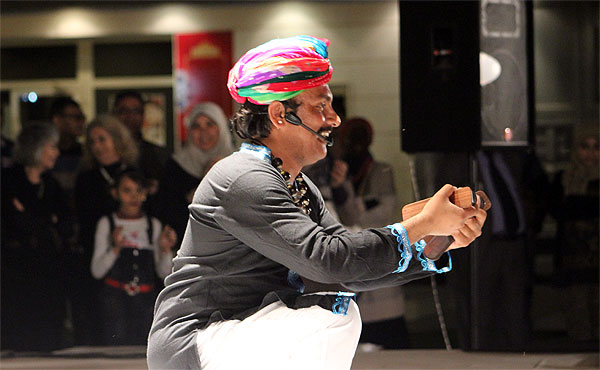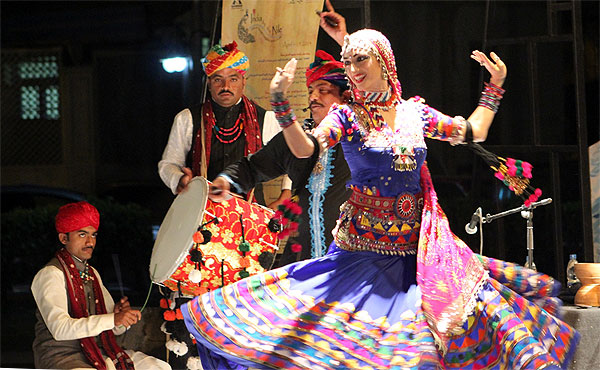Over millennia India has developed an astounding variety of culture, samples of which are annually brought to Egypt with India by the Nile festival.
In its second edition, the festival’s line-up included a captivating performance of folk music: Rajasthan Josh, josh meaning “power.” Following their performances in Cairo (12 April) and Alexandria (13 April), primarily as as part of India by the Nile, Rajasthan Josh performance was also incorporated into the opening night of the International Festival For Drums and Traditional Arts, on 19 April.
Coming from the Land of Kings, on 12 April, the band filled the Midan Theatre, a stage erected outside the Hanager Arts Centre, with the passionate singing accompanied by percussions and colourful large turbans.
Evoking the power of Rajasthan and the breath of the Thar Desert, these refreshing winds ameliorated the heat. The listeners were taken on a journey through the soulful fables, vibrant rhythmic patterns and elaborate qawwali (Sufi music of devotion). At times the audience listened attentively, at other times they cheered, clapped or joined the musicians for the recurrent phrases.
Rajasthan Josh was formed in 2009 by its leader, Chugge Khan, and it brings together many musicians who just as often play solo. In India, the band performs with a huge number of percussion instruments. This Cairo performance involved only six members of Rajasthan Josh, all from the same family of musicians. They speak Marwari, the Rajasthani dialect in which they sing, as well as Sindhi and Hindi-Urdu. Carrying down the tradition from their ancestors, Rajasthan Josh members come from the Manganiyar Muslim community living predominantly in Jaisalmer (The Golden City) and the surrounding villages in northwestern Rajasthan.
Manganiyar means “those who ask for alms” and, historically, those musicians sang for the kings and feudal landlords on various occasions like marriage and even mourning. Today, they are known to be highly skillful musicians who pass their artistic wealth from one generation to the next. Manganiyar musicians are always men as women do not perform in public. Due to their particular geographical and political positioning, Manganiyar community represent a unique mixture of cultural practices and religious beliefs.
Music of the Manganiyar community fuses elements of Hindustani classical music with the Sufi music associated with the now Pakistani province of Sindh. A large number of Manganiyar lyrics are about love, yet they also sing of life, love of God and the Prophet Mohamed.

Chugge Khan performing on khartal. (Photo: Ati Metwaly)
The internationally acclaimed pillar of the Rajasthan Josh, Chugge Khan, began performing as the youngest khartal (wooden hand claps) player. He made his first international debut at the tender age of ten, and since then has participated in a multitude of festivals, performing across 17 countries. Chugge, who moderates each song, also plays morchang (a jaw harp, a kind of a lamellaphone) and bhapang (a string monochord instrument); he also often provides vocal lines.
In fact the band members are capable of playing many instruments and often exchange roles. The harmonium gives base and tune in each song, and it is the only instrument that the Manganiyar musicians buy; they make all their other instruments. The droning sound of the harmonium also sets the tone for the singer who follows Bhairavi, the most popular raga in which the melodic line is set in the highest range of the scale.
This vibrant musical structure, which includes percussion and woodwind instruments, is then placed over the harmonium drone. In this colourful plethora you can also hear Salim Khan joining on algoza, a pair of flutes made of bamboo played together like the Egyptian arghoul. A mournful yet brisk sound is produced by one flute, providing one continuous tone, while the other adds a variant melodic line. Gule Khan played the dholak, the main instrument accompanying qawwali, a two-headed hollow hand-drum with each side producing a different sound.
In his turn Kheta Khan, who performed on both the khartaal (made of rosewood, sheesham) and the morchang, joined Chugge for one captivating rhythmic duet. Also known as the jaw harp, the morchang consists of a metal ring and a metal tongue, and is placed between the teeth.
“Morchang was initially used by the shepherds to call the herd of animals. With the emergence of folk groups, morchang has been incorporated into music. As the musician inhales and exhales air, the wire attached to it vibrates; the mouth movements control the pitch,” Kheta explained.
At times joyful in their character, at other times laid back, as if contemplating life, the anatomy of some compositions is obviously extremely complex. Yet, throughout their performance, the Rajasthan Josh projected a captivating clarity together with harmony and impeccable coordination.
Shafi Khan, singer and harmonium player, explains that the flow of each composition is in a constant relation with audience response: “We perform several songs composed by Chugge that are part of our standard repertoire, however in some compositions there is a lot of room for improvisation. If the audience engages, we respond to it with rhythm. If a tune is slower and we lose contact with the audience, we try to shift to a more dynamic tempo. The main aim of the performance is to create a link with the listeners and to make everybody happy. And though this relationship is important, we always make sure not to lose the main fragrance of the music.”

Colleena Shakti, an India-based American dancer, performs Kalbelia. (Photo: Ati Metwaly)
In their Cairo performance, Rajasthan Josh incorporated yet another artistic flavour of Rajasthan. Colleena Shakti, an India-based American dancer, performed Kalbelia, a jubilant and energetic dance involving a great deal of whirling. The Kalbelia community follows Hinduism and is known for catching and trading in snakes. Some numbers of this dynamic dance imitate the serpent’s movement and serpent-like patterns adorn the richly coloured dress of the dancer. Each appearance of Shakti additionally invigorated the crowd already enchanted by the swirling.
As Rajasthan Josh performed a number of their standard compositions, their passion for life and devotion to music emerged from the clicking sounds of khartaal, beats of dholak and breath, giving life to algoza. Music is the only life that Manganiyar musicians know, and the only craft they master, and this is probably why they search for new formulas that would attract audiences to their performance. With much competition, only a few musicians make it to the international sphere. And since this spotlight guarantees their families a decent life, they try to fuse the folk heritage-based material with compositions that draw on different cultural elements. As such a performance of Kalbelia is done only for an international audience.
“We are one big community, we intermarry within the community and our lives depend completely on continuous practice, perfecting of skills, creativity and performing,” Shafi Khan commented, pointing to the competition but also to the growing interest in Rajasthan’s cultural heritage. “Now that we started travelling and exporting our music, we began realising how important education is.” A large number of people in the community never went to school and music is their only occupation. Shafi Khan added that as they continue passing music to their children, they also want them to be able to “hold hands with everybody around the world, and education will help secure their futures.”
From their successful performances in Egypt, Rajasthan Josh will continue transporting their musical tales and artistic vitality to the many audiences they keep crossing paths with. The band’s upcoming commitments include their home country India and probably Singapore. In Egypt, they have definitely marked the listeners’ minds. Chugge’s edgy timbre, his half-closed eyes in concentration and dynamic clicking of khartal, Shafi’s steady drone and vivid rhythmic embroidery will always recall the cultural riches that Manganiyar musicians brought to us here, making us all the more thankful for India by the Nile.
This article was originally published in Al Ahram Weekly
Short link: